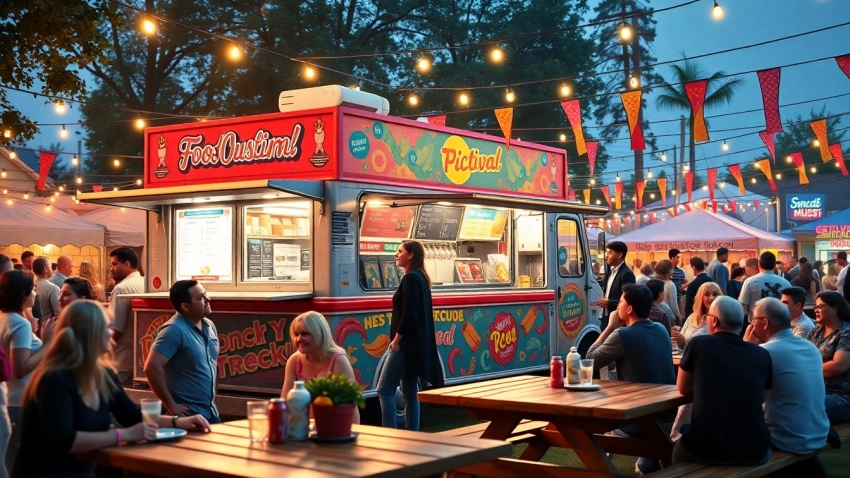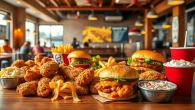
Boost Your Business with a Food Truck: A Comprehensive Guide
Introduction to Food Truck Culture
The world of food trucks has evolved into a vibrant and popular phenomenon that represents innovation in the culinary arts and entrepreneurship. Food trucks offer not just meals but experiences that entice the senses. With their mobility, unique menus, and often engaging themes, they have become staples at festivals, events, and street corners. The allure of a food truck is heightened by its ability to bring gourmet options to various locales, transforming ordinary dining into an event. As a potential or current food truck operator, understanding the dynamics of this niche can significantly impact your success. Whether you are curious about the food truck industry or looking to expand your existing venture, this guide will provide comprehensive insights into the essential aspects of operating a food truck.
Overview of Food Truck History
Food trucks trace their roots back to the 19th century when “chuck wagons” were used to serve meals to cowboys on cattle drives. As cities grew, these mobile kitchens evolved, turning into street vendors that offered a variety of foods to urban dwellers. The modern food truck gained momentum in the United States during the early 2000s, coinciding with a resurgence in street food culture influenced by culinary creativity and a shift towards food accessibility. Today, food trucks serve everything from gourmet tacos to artisanal desserts, bridging cultural gaps and catering to diverse culinary tastes.
Benefits of Operating a Food Truck
The advantages of running a food truck are numerous. For entrepreneurs, the lower initial investment compared to a brick-and-mortar restaurant makes food trucks an appealing option. They offer flexibility in location, allowing owners to participate in different events or capitalize on high foot traffic areas. A food truck also enables a diverse menu without the extensive overhead costs associated with traditional dining establishments. Additionally, the mobile nature of food trucks facilitates direct interaction with customers, fostering a community connection that can lead to loyal patronage.
Challenges Faced by Food Truck Operators
While the food truck industry presents exciting opportunities, it also comes with unique challenges. Unpredictable weather, fluctuating demand, and varying regulations can affect daily operations. Securing the necessary permits and adhering to health regulations can be daunting for new operators unfamiliar with local laws. Additionally, the competition is fierce, and it can take time to build a loyal customer base. Despite these hurdles, many food truck owners remain optimistic, armed with passion and perseverance.
Choosing the Right Type of Food Truck
Types of Food Trucks: Specialty vs. General
When choosing the right type of food truck, operators must consider their niche. Specialty food trucks focus on a specific cuisine or style, such as tacos, gourmet burgers, or vegan options. These trucks often attract a dedicated customer base enthusiastic about their offerings. Conversely, general food trucks may provide a broader menu and aim to appeal to a wider audience. Ultimately, understanding your target market is crucial in deciding which style suits your business vision.
Essential Features for Optimal Functioning
For a food truck to function effectively, it must be outfitted with essential equipment that complies with health codes and culinary practices. Key features include cooking appliances, refrigeration units, and effective food storage solutions. Additionally, investing in a reliable POS system to manage sales and inventory can streamline operations. Adequate space for food preparation while ensuring customer flow is also vital in enhancing the overall service experience.
Choosing a Theme and Menu
A cohesive theme can set a food truck apart in a crowded market. Consider factors such as the target audience, the food landscape in the area, and personal culinary passions when selecting a theme. The menu should align with the chosen concept, offering a signature dish that becomes a hallmark of your brand. Seasonal offerings or limited-time specials can create excitement and bring customers back for more.
Legal Considerations for Food Truck Operation
Licenses and Permits Required
Operating a food truck requires navigating a complex landscape of licenses and permits. These can vary significantly between municipalities, so it is crucial to research local regulations thoroughly. Typically, a food truck will need a business license, health department permit, and food service permit, among others. It is best to reach out to local health departments to ensure compliance before launching.
Local Health and Safety Regulations
Beyond permits, food trucks must adhere to strict health and safety regulations to protect their customers. This includes proper food handling procedures, maintaining cleanliness, and conducting regular food safety training for staff. Meeting these standards not only helps in legal compliance but also builds trust and credibility with customers who prioritize safety.
Catering vs. Street Service: Legal Implications
Food trucks can operate in different capacities—catering at private events or serving customers on the street. Each path has unique legal requirements. Catering may necessitate additional permits or insurance to mitigate liability. Conversely, street service may require specific zoning regulations, ensuring compliance with where and when you can operate. Understanding these distinctions is crucial for proper legal operation.
Marketing Your Food Truck Effectively
Building an Online Presence and Social Media Strategy
In a digital age, establishing a robust online presence is essential for any food truck. Social media platforms such as Instagram and Facebook allow operators to showcase their meals, engage with customers, and announce their locations in real-time. Regularly posting high-quality images, sharing customer testimonials, and participating in food challenges can enhance visibility and attract followers eager to hunt down your truck.
Utilizing Local Events and Festivals for Promotion
Food trucks often thrive at community events and festivals, where they can tap into a diverse audience. Participating in local street fairs, food festivals, and markets not only boosts sales but serves as excellent marketing opportunities. It’s crucial to research the types of events your target audience frequents to maximize exposure and sales potential.
Creating a Unique Brand Identity
Brand identity is crucial in differentiating your food truck from competitors. This encompasses everything from logo design and truck aesthetics to the voice you use online. A unique and relatable brand can attract customers and create a sense of connection. Utilizing merchandise or promotional items, like branded cups or T-shirts, can also help propagate your brand beyond the truck.
Measuring Success and Growth of Your Food Truck
Key Performance Indicators to Track
To gauge the success of a food truck, operators should track several key performance indicators (KPIs). Sales revenue, average ticket size, and customer traffic are foundational metrics. Additionally, monitoring food costs and food waste can provide deeper insights into operational efficiency. Analyzing online engagement metrics, like followers’ growth and post interactions, can also inform your marketing strategy.
Customer Feedback and Adaptation Strategies
Listening to customer feedback is paramount for continuous improvement. Implementing surveys or encouraging reviews can yield invaluable insights into customer satisfaction. Adaptation strategies should encompass menu adjustments, changing operating hours, or even truck aesthetics based on client preferences. Being receptive to customer input can enhance loyalty and attract new business.
Expansion Opportunities: Catering and Franchising
As a food truck gains traction, owners can explore expansion opportunities such as catering private events or even franchising their business model. Catering can significantly increase revenue by tapping into larger parties and corporate functions. Franchising can provide a pathway to scale operations, giving others the chance to operate under your brand with guidelines to maintain consistency. Both paths demand careful planning and resource allocation to ensure continued success.












Leave a Reply